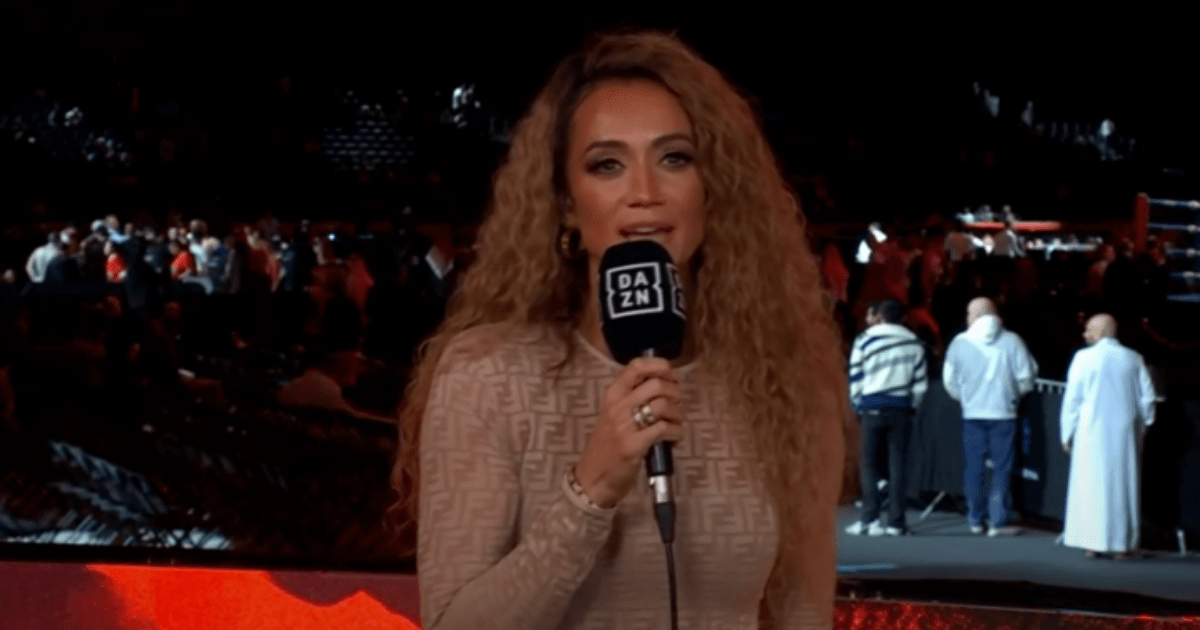DAZN Delight
Boxing fans were thrilled to see Kate Abdo hosting the boxing coverage on DAZN alongside David Haye and Conor Benn in Saudi Arabia. The trio is in Saudi ahead of Anthony Joshua's highly anticipated fight with Francis Ngannou.
Fans' Cheers
Viewers flocked to DAZN and didn't hesitate to express their admiration for Kate Abdo's presence. Many took to social media to praise her performance and style, with one fan saying, "Kate Abdo though…" and another adding, "Kate Abdo is brilliant."
Money Well Spent
Despite the £19.99 price tag, fans had no complaints about the coverage, feeling that their money was well spent. One fan even noted, "Man, @kate_abdo stays killing it with the outfits."
The Fight Ahead
Anthony Joshua is set to face Francis Ngannou in Saudi Arabia for his third bout in the desert, while Ngannou, the MMA superstar, is stepping into the boxing ring for only the second time. Ngannou, weighing in at 19st 6lb, expressed his determination to prove himself despite being considered the underdog.

Joshua's Confidence
On the other hand, Joshua, weighing in at 18 stone, exuded confidence, stating, "I'll deliver. I'm the postman." Fans are eagerly anticipating this clash between two heavyweight fighters.
Frequently Asked Questions
Is it possible to learn boxing professionally for anyone?
Even though boxing may be accessible to all, not everyone is cut out to compete professionally. Professional boxing requires a unique blend of talent, physical abilities, mental toughness, and dedication. Prospective boxers should also be willing accept the inherent risk of the sport. A thorough assessment by a coach can determine if a person has the potential to make a career out of boxing.
How do boxers keep their weight in check and manage their weight classs?
Boxers keep their weight under control by following a rigid diet and a specific training program. They work with nutritionists on a diet plan designed to help them reach their weight target without sacrificing the nutrition and energy needed for training. Exercise and weight monitoring are important, particularly as the fight nears. Weight management involves a strategic approach that, if not performed correctly, can result in health problems and/or poor performance.
How important is physical fitness in professional boxing?
Physical fitness is essential for professional boxing. Sport requires high levels strength, speed endurance and agility. Professional boxers must engage in a tailored fitness program that includes aerobic and anaerobic exercises, strength and resistance training, and flexibility workouts. Without superior physical conditioning, a boxer’s ability to train effectively and perform in the ring is significantly compromised.
What equipment is essential for someone starting in professional boxing?
Equipment essential for those who want to get into professional boxing include boxing gloves, mouthguards, headgears (for sparring) and the right footwear. The use of a heavy, speed, or double-end bag is essential for technical workouts. Quality equipment is important for safety and durability. Subpar gear increases the risk of injury.
What are professional boxing’s risks?
As with any contact sport there are inherent risks in professional boxing. There are many acute injuries that may occur, including head trauma and fractures. Chronic conditions can also develop, such a concussions. While proper training, safety equipment and compliance with boxing regulations can reduce the risks, they will never be eliminated. Accepting and understanding these risks are essential to choosing to box professionally.
What role do managers and promoters have in the professional career of a boxer?
Promoters and managers are crucial to a professional boxer’s career. Managers are in charge of guiding a boxer’s professional career, negotiating contracts and managing the boxer’s business affairs. They can also assist in choosing the right fights for the boxer and take care of his or her interests. The promoters focus more on organizing events, marketing fights and attracting sponsors and audience attention. This increases a boxer’s public profile and earnings potential.
What are key elements of a fighter’s training regimen?
A boxer’s training program is typically composed of a few key components. They include technical skill building, tactical drills and strength and conditioning. Sparring and mental training are also included. While tactical drills are used to develop fighting strategies and improve defensive moves, technique-focused workouts focus on improving punch accuracy. Sparring and conditioning exercises provide practical combat experience. Mental training emphasizes confidence, focus, and resilience.
Statistics
- The average age for boxers to turn professional is between 18 to 25 years, though many continue to compete well into their 30s and beyond.
- On average, a professional boxer spars between 100 to 200 rounds in preparation for a major fight.
- Reports suggest that successful professional boxers can earn upwards of 50 times more than the median purse for entry-level professionals per fight.
- Professional boxers typically train 4 to 6 hours per day, 5 to 6 days a week, depending on their fight schedule.
- Around 60% of professional boxers supplement their income with other activities or jobs, due to variability in fight earnings.
- Statistical data indicates that there has been a 15% increase in the number of professional boxing gyms over the last decade.
- Less than 10% of professional boxers are undefeated throughout their career, highlighting the sport’s competitive nature.
External Links
sweetsciencefitness.com
wbcboxing.com
proboxing-fans.com
titleboxing.com
ibhof.com
boxingnewsonline.net
teamusa.org
How To
How to Lose Weight for a Boxing Fight
Managing your weight before a boxing fight requires a disciplined approach. Establish a nutrition plan that focuses on lean proteins, complex carbohydrates, and hydration while cutting back on high-sodium and high-fat foods. Water weight can be controlled by increasing your water consumption several weeks prior to the fight, and then gradually decreasing it. Increase your intensity during workouts and incorporate sauna sessions, if necessary. Avoid drastic weight loss techniques and always prioritise safety.

